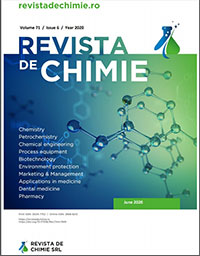|
REVISTA DE CHIMIE Cite as: Rev. Chim. https://doi.org/10.37358/Rev.Chim.1949 OSIM Nr. R102355 ISSN Online 2668-8212 ISSN Print: 1582-9049 ISSN-L: 1582-9049 |
 Latest Issue >>> |
| CONFERINTELE DE CHIMIE CONTEMPORANA |
 Virgil Percec |
 Michel Che |
 Henning Hopf |
 Mir Wais Hosseini |
 Achim Muller |
 Jean-Marie Lehn |
 Christian Roussel |
 Frederic Fotiadu |
 Bogdan C. Simionescu |
 Victor Sahini |
 Ionel Haiduc |
HENNING HOPFProfessor Henning Hopf sustained in 2011, within Contemporary Chemistry Conferences, the lecture 'How functional groups interact? Studies on Cyclophanes'. Mr. Hopf, who is now professor at Braunschweig University of Technology - Germany, graduated the Faculty of Chemistry at the University of Gottingen as 'Diplomchemiker' in 1963. He then continued his studies in organic chemistry, being conferred the 'Master of Science' degree at the University of Wisconsin - Madison, USA. After two more years spent in the same American university, he was conferred the 'Doctor of Philosophy' degree, with the thesis 'Solvolysis Reactions of benzhydrol - esters'. Under the scientific coordination of Prof. H.M. Frei at the University of Reading, United Kingdom, Mr. Hopf committed to a post-doctoral scholarship and then he was conferred all academic degrees in the German higher education system. He started as an assistant at the University of Marburg (1967-1969) and Karlsruhe (1969-1972), continued as a Privatdozent at the Technical University of Karlsruhe (1972-1975), then as a C-3 Professor at the University of Wurzburg (1975-1978) and later as a C-4 Professor at Braunschweig University of Technology, where he still teaches. From a scientific point of view, Professor Henning Hopf approached a series of up-to-date research themes in organic chemistry, out of which stand as remarkable evidence: the chemistry of olefins, acetylenes and cumulenes; the mechanisms of thermal reactions; new materials with properties of liquid crystals; the study of polyenic systems related to well-known natural structures: beta-carotenes, vitamins, etc.; the examination of ecologically important processes, placed under the umbrella of environmental protection. More precisely, his research showed, for instance, that cyclophanes own a specific geometry which offers numerous applications in supramolecular chemistry. His outstanding scientific achievements - around 600 papers, books, patents etc., brought Professor H. Hopf indisputable international prestige. Consequently, he was invited to be part of various international scientific organizations, such as: Gesellschaft Deutscher Chemiker (1963), American Chemical Society (1965), Royal Society of Chemistry (1979), European Photochemical Association (1978) etc. Mr. Hopf was awarded prizes, distinctions and honorary scientific titles: Fulbright Scholarship (1963 1964), Award of the Dreyfuss-Foundation of New York (1982), Award of the Japanese Society for Protection of Science (1987), Adolf-von-Baeyer-Denkmuenze of the Gesellschaft Deutscher Chemiker (1996), Creative Award of the University of Oregon Foundation (1998), Gay-Lussac / Alexander von Humboldt-Preis of the French Ministry of Research (1999). Also, he was named Doctor Honoris Causa of Babes-Bolyai University of Cluj-Napoca (2002). Professor Henning Hopf was part of editorial committees of some ISI journals/reviews, such as: Chemische Berichte, Liebigs, Annalen, Australian Journal of Chemistry, Chemie-Studienbuecher at Teubner Verlag, Beilstein-Institute, Nachrichten von Chemie und Labor Technik, European Journal of Organic Chemistry etc. It is worth mentioning the fact that Professor Henning Hopf was appointed vice-president of the German Society of Chemistry: GDCh between 2000-2002 and 2006-2007 and president between 2004-2006. The Faculty of Chemistry of Alexandru Ioan Cuza University of Iasi started the cooperation with the Institutes of Chemistry at Braunschweig University of Technology even since 1995-1996, with the support of professor Hopf who sustained internship Tempus and Socrates-Erasmus Programmes. Taking into consideration all his remarkable achievements, the Board of the Faculty of Chemistry requested the Senate Board of Alexandru Ioan Cuza University of Iasi the award of the title Doctor Honoris Causa to Professor Henning Hopf. |










